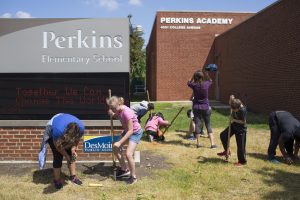A Colorful Spring for Perkins Penguins

From painting a mural to planting a butterfly garden, it’s been a colorful spring for Perkins Elementary School.
The Penguins are busy at Perkins Elementary as the school year winds down. Last weekend students were hard at work painting a mural for display on the exterior of the school and Thursday they collaborated with the Neal Smith National Wildlife Refuge to plant a pollinator garden there.
Monarchs used to be plentiful in Iowa during the summer but they’re becoming as scarce as penguins in these parts.
Thursday morning Patrick Bryant from the refuge was giving a crash course in pollinator gardening to a crew of 2nd graders.
“This is a dibble,” he said, holding a tool aloft. “It’s part spear, part shovel.”
“It’s crayon-shaped,” observed one eager girl. You know, pointy at its tip, to create a snug space for plants like milkweed, mountain mint, black-eyed Susans and other indigenous tallgrasses that pollinator species are drawn to.
According to Bryant, monarch butterfly habitat has declined by 90% in the last two decades, owing to factors including urban sprawl and agricultural pesticides. A deliberate and determined effort is underway to reverse that trend while it’s still possible.
“Last year we planted more than 60 of these gardens,” said Bryant. “The average size is about 400 square feet but this one here is going to be about 8,000-8,500.”
A veritable all-you-can-eat bee and butterfly buffet spread on the ample school grounds.
Jen Chedester is the parent volunteer at Perkins that launched the idea for the garden.
“I heard about a program called People for Pollinators through the refuge and I suggested it to (Perkins) principal Danny Koss. He was all for it. So we supply the space and the manpower and Neal Smith provides the tools, the plants and the expertise.”
While the adult volunteers wheelbarrowed loads of mulch to and fro, student gardeners stomped and wiggled on the dibbles like they were pogo sticks that had lost their bounce. After a full day’s planting the garden was unveiled at an afterschool open house.
Bryant explained that most of the garden’s early growth will be underground as the plants establish roots and settle into place. But while the monarchs, strong as they are pretty, continue their amazing lifecycle of seasonal migration between the upper Midwest and Mexico, the increasing odds against their survival are finally, slowly being reduced. In Mother Nature’s due course a generation will return one foreseeable summer and find a feast waiting for them at Perkins – the one of a kind school, not the restaurant chain.
There is a message board on the sign in the school’s front yard. “Together we can change the world,” is one of the rotating things it has to say. Out in back they were doing it.




